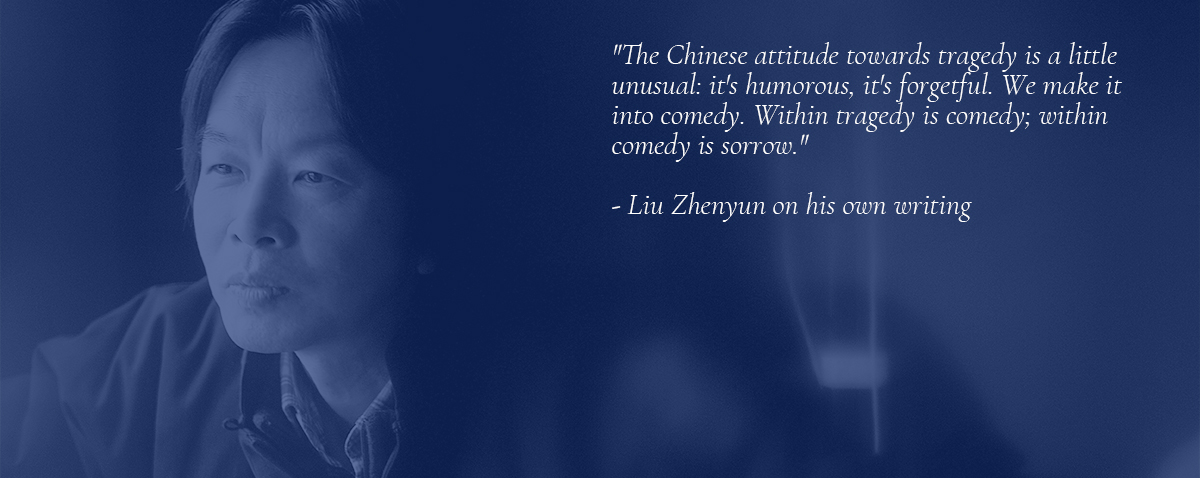Liu Zhenyun is one of China’s most celebrated novelists and screenwriters. His perfectly observed social commentary and well-constructed stories have seen him described as China’s Franz Kafka. He is best known for his novel Someone to Talk To, which won the 2011 Mao Dun Literature Prize.
More of his fiction has been adapted for the screen than that of any other major Chinese author, including the award-winning film I Am Not Madame Bovary, directed by Feng Xiaogang, which became an international hit.
Liu began his writing career by publishing short stories and novellas, many of which are now classics of contemporary literature, including Tofu, Remembering 1942. Later novels, such as The Cook, the Crook, and the Real Estate Tycoon; Someone To Talk To, I Did Not Kill My Husband, Strange Bedfellows and One Day Three Autumns have become critically-acclaimed prize-winners as well as best-sellers.
His numerous awards include China's highest literary honour, the Mao Dun Literature Prize (2011), and France's Knight of the Order of Arts and Letters (2018). Liu’s works have been translated into over 30 languages. To date, over 15 million copies of Liu's works have been sold in China.
He is now winning over a new generation of fans through comedy and social viral clips. He has over half a million followers on Douyin, the Chinese TikTok, with the viral videos of Liu’s comedy series and Literary Masterclass having almost 80 million views.
Liu Zhenyun is a professor and PhD supervisor at the School of Liberal Arts, Renmin University of China and Reading Ambassador for Beijing International Book Fair.
Critical Praise
“Liu Zhenyun’s works have achieved great success with the Chinese people. They have been translated into over 20 languages and enthusiastically received by audiences the world over. A pioneer in magical realism, Liu is also considered by many to be China’s greatest humorist.”
— Award ceremony, Knight of the Order of Arts and Letters (France)
"Liu Zhenyun establishes a narrative form that is complicated yet concise, and his works are endowed with cultural and philosophical significance. Traversing the rise and fall of all living things in this vast world of ours, he offers an exquisite analysis of the spiritual conditions of the Chinese people. In his tireless examination of Chinese style and the Chinese heart, he carries on the spirit of critical reflection from the May Fourth era, while at the same time echoing the traditions of classical literature. The results are original and remarkable.”
— on Someone to Talk To, 8th Mao Dun Literature Prize
“Liu Zhenyun’s works chatter on pleasantly, yet they also carry a powerful force, writing about anything from national affairs to folk customs and handling complicated matters with ease. Everything is vivid and lifelike, from the grandest temple to the pettiest squabble, with rich layers of meaning lying beneath the surface. His pen is ruthless, but his heart is kind.”
— on I am Not Madame Bovary, 8th China Film Directors’ Guild Awards
“His works are literary and philosophical, while at the same time very readable--a rare combination.”
— Sabina Knight, professor and author of Chinese Literature: A Very Short Introduction
“Liu Zhenyun has the ability to employ the simplest methods to write about the most complicated things.”
— Geneviève Imbot-Bichet, French translator and publisher
“Liu Zhenyun uses humor to reach the absurdity at the heart of the matter.”
— Michael Kahn-Ackermann, German translator
“Liu Zhenyun’s humor is just a mask; behind it is serious thought.”
— Anna Gustafsson Chen, Swedish translator
“Liu Zhenyun’s works tell more than just a Chinese story—they discuss the human circumstances we all face.”
— Daniele Beltrame, Italian literary scholar
“Liu Zhenyun provides incredibly piercing, insightful descriptions of the awkward circumstances of life and humanity.”
— Liljana Arsovska, Mexican translator
Liu Zhenyun's works—humorous, penetrating, and on point—are beloved by both Chinese and foreign readers alike.
— Alexey Rodionov, Russian translator
Liu Zhenyun’s works show that he is as compassionate as he is funny.
— Jirō Asada, Japanese writer
Liu Zhenyun’s works are full of humor and embody a Chinese logic.
— Kim Tae Sung, Korean translator
If someone asked me to recommend a Chinese novel, I would definitely suggest one of Liu Zhenyun’s. After reading his works, I gained an understanding of the complicated inner world of the Chinese people, while at the same time laughing more than I have reading any other Chinese author’s writing.
— Ahmed El-Saeed, Egyptian translator
